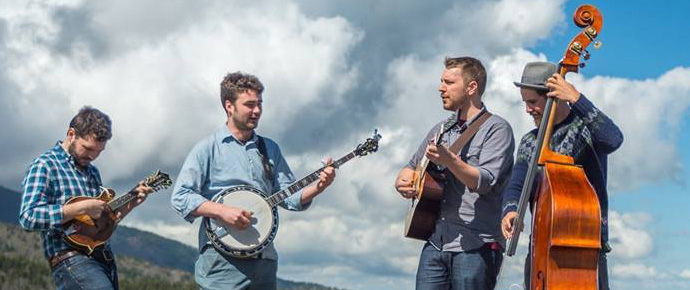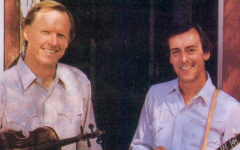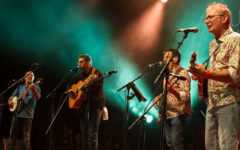
Authenticity is a hard commodity to come by, a casualty of the need for commercial credence. Traditional music may not be the most viable option in the marketplace today, but the resurgence of bluegrass and the emergence of that hybrid known as “Grassicana,” both here and abroad, shows that listeners are indeed enticed by the new populist precepts.
As a result, there are ample reasons why more bands are referencing their roots. As this column aims to prove, even bands that hail from beyond the American heartland are making music without gimmickry or pretence while still attracting a devoted following in the process.
One such band is known as the Slocan Ramblers, a Canadian collective whose name sounds as authentic as the vintage sound that emanates from their grooves. They don’t just adapt bluegrass for their mantra; they devote themselves to it entirely. As a result, they sound so authentic, they could easily pass for an Appalachian ensemble circa the ‘30s or ‘40s, with Woody Guthrie at the helm no less. To achieve that goal they eschew most modern accoutrements in favor of banjos, guitars, and mandolin, even to the point of integrating an ample number of instrumentals into their musical mix.
“I think a lot of the roots of the music are the same as much of the traditional music we have here in Canada,” bassist, banjo player and occasional singer Alastair Whitehead explains. “A lot of the instrumental tunes are the same ones fiddle players in Canada play on the east coast or in the Ottawa Valley. The influence of the Scottish and Irish fiddle music is something familiar, while the influence of American blues and jazz gives bluegrass a unique sound, the blend of the two creates a sound that really seems to resonate with a lot of people. It’s hard to put into words. Something about the music is just infectious, there’s a reason it gets around.”
Indeed, the band’s last effort, Coffee Creek, not only boasted its share of cover songs (Roy Acuff’s Streamline Cannonball, Alton Delmore’s Mississippi Shore, Woody Guthrie’s Pastures of Plenty) and traditional tunes (Groundhog, Rambling Sailor) but also well-etched originals (Coffee Creek, Call Me Long Gone, Galilee) that make it hard to tell what came from the pens of the band members and what was borrowed from archival sources. Ultimately, this is Grassicana the way it was meant to be played, with energy, exhilaration and commitment.
“I grew up on the east coast of Canada in Newfoundland where there is a strong tradition of folk music, in particular Celtic music,” Whitehead continues. “There is no shortage of kitchen parties with fiddles and accordions, people picking tunes and socializing. While I wasn’t exposed to bluegrass all that much growing up, I was definitely around a lot of fiddle music, and people that like to get together and play folk music. It wasn’t until I moved to Toronto that I really got into bluegrass. I was studying jazz at college and getting a little burnt out on it. I had a few bluegrass records that I had been listening to a lot, and decided to try and check out some of the local bluegrass bands. As luck would have it, Toronto had one of the best weekly bluegrass shows in Canada. Every Wednesday at the Silver Dollar you could see some of Canada’s best bluegrass pickers play three sets for three bucks. It was always packed and the band always sounded incredible. There was something about the music and the energy and the community of the bluegrass scene in Toronto that reminded me a lot of the music I had grown up around, and really drew me in. It was pretty immediate. I was totally hooked. It was all downhill from there!”
Naturally then, the similarity in styles between American roots music and the folk tradition that Whitehead grew up with made for a natural transition. As Whitehead suggests, it’s all part of a universal language that utilizes the same attitude and inspiration. It’s certainly a sensibility that hasn’t been lost on our neighbors to the north. Whitehead and his bandmates can attest to its universal appeal.
“Bluegrass definitely has a strong foothold in Canada,” Whitehead agrees. “As a band, we have toured all over North America, The U.K., and as far as Israel. It never ceases to amaze me that everywhere we go there are always bluegrass fans. We always connect with people that really know the music, and in almost every case play the music themselves. Canada is no exception. There is bluegrass pretty much coast to coast in Canada. Much like the U.S., it varies from east to west. Certain provinces seem to have picked up different aspects of the music, and some places seem to be a little more traditional or progressive than others, but there’s bluegrass in one form or another pretty much all across the country. We are blessed with a very vibrant bluegrass and old time scene here in Toronto, with live bluegrass happening pretty much every night of the week. There is a really great scene with some great players out in Nova Scotia and the east coast, and a lot of great bluegrass happening in Alberta and B.C. There’s some great festivals, and bluegrass camps up north in the territories as well. To be honest if you didn’t like bluegrass it would be pretty hard to get away from it.”







